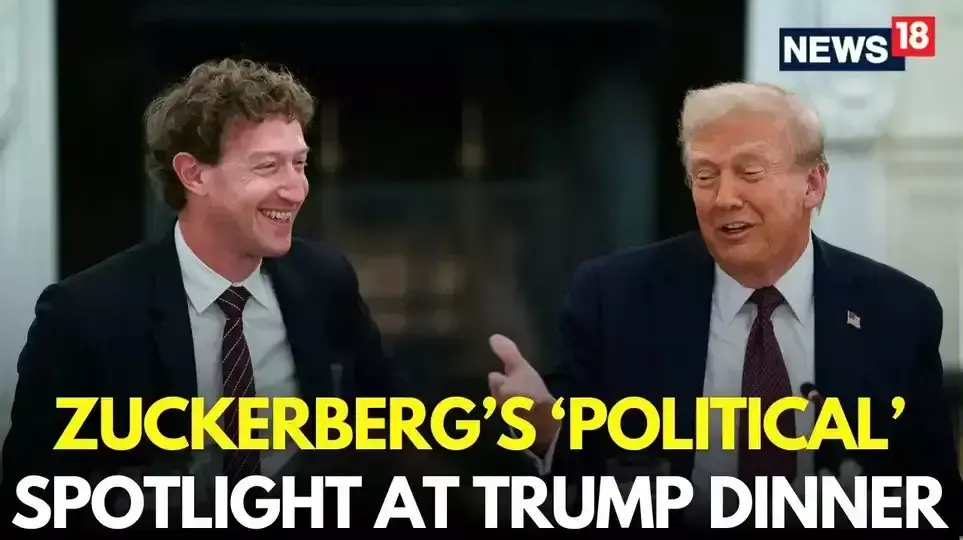- Home
- »
- Breaking News »
- “Hot Mic” Moments with CEOs & Political...
“Hot Mic” Moments with CEOs & Political Interactions: 15 PR Lessons from the Zuckerberg–Trump Dinner
Zuckerberg’s hot mic apology to Donald Trump at a White House dinner raised questions about optics, influence, and PR consequences. Discover 15 key lessons from CEO–political interactions.

Introduction: When Private Words Become Public Headlines
A hot mic moment can change the course of public perception in seconds. In one recent example, Mark Zuckerberg was overheard apologizing to Donald Trump at a White House dinner. What might have been a private, polite exchange quickly turned into a viral headline with PR consequences, political undertones, and public debate.
The Context: Zuckerberg at the White House Dinner
Why the Hot Mic Moment Went Viral
The setting—a White House dinner with a former U.S. President—already carried political weight. A stray remark in such a room was bound to make headlines.
Political Optics in High-Profile Events
When CEOs meet political leaders, every word, gesture, and smile is scrutinized. Optics often matter as much as substance.
The Power of “Hot Mic” Moments
History of Leaders Caught Off Guard
From politicians muttering candid thoughts to CEOs sharing private frustrations, hot mic moments have long shaped media narratives.
Why These Moments Dominate News Cycles
They feel authentic, unfiltered, and revealing, giving the public a rare glimpse into how leaders act when they think no one is listening.
PR Consequences for CEOs
Damage to Public Image
Zuckerberg’s apology was read by some as weakness, deference, or political bias, fueling public skepticism.
Restoring Trust and Transparency
A quick, measured statement can help neutralize controversy, but timing and tone are crucial.
Political Influence and Corporate Relations
Why CEOs Attend Political Dinners
Such events offer access, networking, and influence, helping companies align with policymakers.
Risks of Being Too Close to Power
The downside: appearing partisan, which can alienate customers, employees, or regulators.
15 Lessons from Big Tech’s Court Victories
Lesson 1: Every Word Counts in High-Stakes Rooms
Leaders must act as if the mic is always on.
Lesson 2: Technology Makes Privacy Fragile
Tiny recording devices and smartphones make slips inevitable.
Lesson 3: Optics Can Outweigh Intentions
What the public perceives matters more than what was meant.
Lesson 4: CEOs Must Master Body Language
Even nonverbal cues get dissected in photos and videos.
Lesson 5: Apologies Shape Public Perception
A well-timed apology shows accountability, but tone matters.
Lesson 6: Political Neutrality Is Hard to Maintain
Even small gestures can look like endorsements.
Lesson 7: Media Loves a Scandal
A hot mic is irresistible to newsrooms.
Lesson 8: Transparency Beats Damage Control
Open acknowledgment prevents speculation.
Lesson 9: PR Teams Must Prepare for the Unexpected
Crisis simulations should include “caught on mic” scenarios.
Lesson 10: Social Media Amplifies Every Slip
Within minutes, clips spread worldwide.
Lesson 11: Reputation Is Built Over Years, Lost in Seconds
One mistake can undo years of brand building.
Lesson 12: Silence Can Be Misinterpreted
No response may look like guilt.
Lesson 13: Humor Sometimes Softens Blunders
Lightheartedness can defuse tension—if used wisely.
Lesson 14: Crisis Communication Requires Speed
Delays allow narratives to spiral out of control.
Lesson 15: Relationships Between Business and Politics Are Always Scrutinized
Balance is essential—too much closeness invites backlash.
The Larger Trend: CEOs in Politics
From Silicon Valley to Washington
CEOs increasingly play roles in policy-making and political influence, especially around tech regulation.
Why Corporate–Political Interactions Are Increasing
Governments seek expertise, campaign funds, and innovation, while companies seek favorable regulations and partnerships.
Global Reactions: What the Public Thinks
Reactions to Zuckerberg’s hot mic ranged from mockery to concern. Some saw it as harmless small talk, while others read it as symbolic of Big Tech’s coziness with political power.
Comparisons with Past CEO–Political Hot Mic Moments
Other CEOs have been caught in similar binds, showing that authenticity is double-edged: it can make leaders relatable, but also vulnerable.
FAQs
1. What is a hot mic moment?
It’s when someone is overheard on a live microphone saying something unintended for the public.
2. Why was Zuckerberg’s hot mic apology controversial?
Because it suggested political deference, sparking debates about bias and influence.
3. Do hot mic moments always damage reputations?
Not always—some can humanize leaders, but many trigger backlash.
4. Why do CEOs attend political dinners?
For networking, influence, and aligning with policymakers.
5. How should PR teams handle hot mic scandals?
With quick, transparent communication to control the narrative.
6. Can leaders avoid hot mic risks?
Yes—by treating every environment as potentially public.
Conclusion: The Thin Line Between Influence and Image
The Zuckerberg–Trump hot mic episode shows that in the age of constant surveillance, instant news, and viral sharing, leaders must assume they’re always being watched—and judged.
For CEOs, the challenge is walking the fine line between political engagement and public trust, knowing that even a whisper can echo worldwide.
Zuckerberg’s hot mic apology to Donald Trump at a White House dinner raised questions about optics, influence, and PR consequences. Discover 15 key lessons from CEO–political interactions.
Zuckerberg’s hot mic apology to Donald Trump at a White House dinner raised questions about optics, influence, and PR consequences. Discover 15 key lessons from CEO–political interactions.


